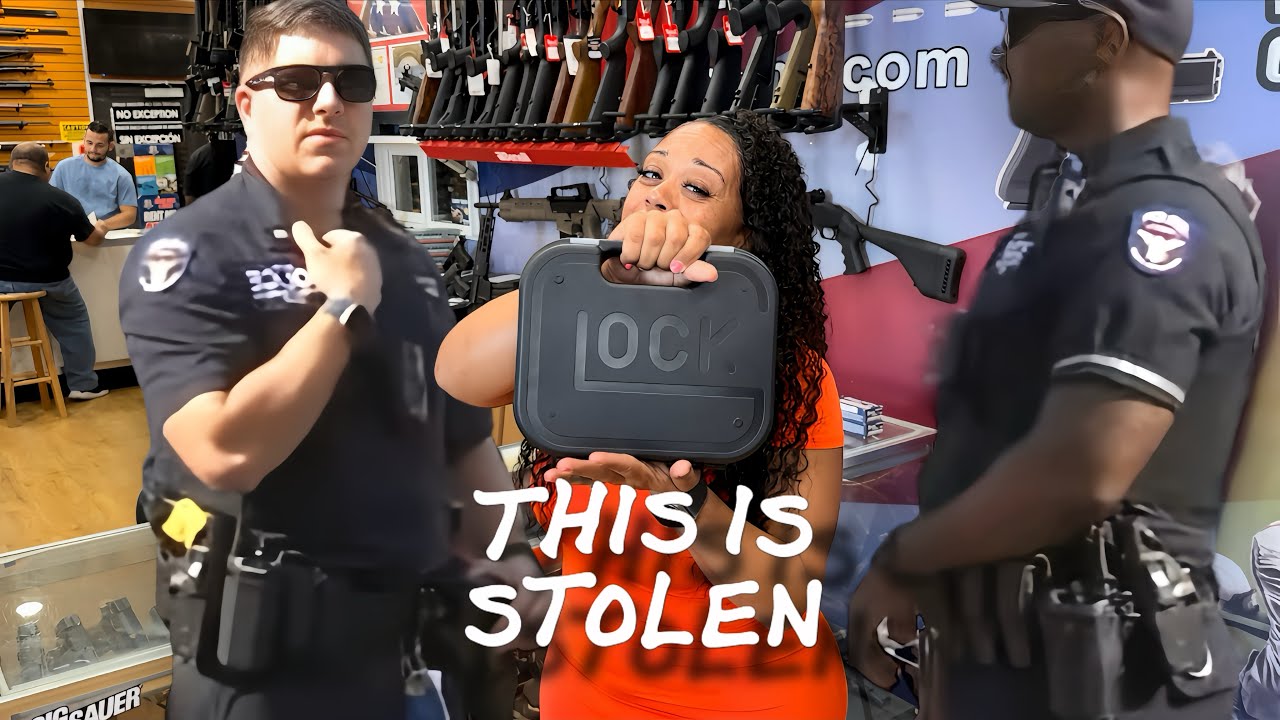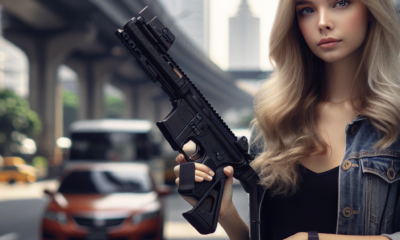Womens Firearms
The Importance of Proper Training with Personal Protection Firearms

Hello, ladies! I’m Jade Tripp, and today I want to talk about a topic that resonates with all of us: personal safety. In today’s world, being prepared is not just about awareness; it’s also about knowing how to protect ourselves. Firearms can be a viable part of our personal protection strategy, but only when approached with the right education and respect. Let’s dive into why proper training is crucial for the effective and responsible use of personal protection firearms.
Understanding the Commitment
When considering a firearm for personal protection, it’s essential to understand that it comes with a responsibility. Proper training not only equips you with the skills required to use a firearm effectively but also instills a mindset of safety, accountability, and respect for the weapon.
Real-Life Example: The Case of the Texas Woman
Take, for example, the story of a woman named Sarah from Texas. After a series of unsettling experiences in her neighborhood, Sarah decided to purchase a handgun for personal protection. Rather than letting fear dictate her actions, she enrolled in a local firearms training course. Through intensive practice and guidance from her instructors, Sarah learned not just how to operate her weapon but also the critical importance of situational awareness and de-escalation tactics.
While she never had to use her firearm in a threatening situation, Sarah felt empowered and in control, knowing she had the skills to protect herself if necessary.
Types of Training: What You Need to Know
-
Basic Firearm Safety Course: Every woman considering a firearm should start with a safety course. This foundational training typically covers handling, storage, and the critical rules of firearm safety, ensuring you understand the core principles.
-
Marksmanship Training: Once you’re comfortable with the basic guidelines, the next step is improving your aim and handling skills. Look for local ranges or instructors that offer training programs focusing on marksmanship. Online resources are great, but hands-on training offers invaluable experience.
-
Self-Defense Tactics: Firearm training goes beyond just pulling a trigger. You should incorporate self-defense tactics, including situational awareness and conflict resolution strategies. Many self-defense classes, like Krav Maga or women-specific workshops, can complement your firearm training.
- Ongoing Education: The world of firearms is always evolving, and so should your training. Seek opportunities for advanced classes that cover various scenarios, like shooting under stress or low-light conditions.
Example: The Self-Defense Class Movement
Organizations like the Women’s Defense League and A Girl’s Guide to Guns run workshops that blend self-defense and firearms training. These programs empower women by providing critical skills in a supportive environment.
The Psychological Aspect of Proper Training
It’s important to recognize the psychological readiness that comes with proper training. Women often face societal pressures and fears regarding firearms, but being educated and practiced can bolster your confidence. You won’t just feel like you can protect yourself; you’ll know you can.
Consider the story of Mary, who, after a traumatic incident, sought training. It was through proper instruction that she learned to manage her fear, gaining not only skill but also a newfound resolve and peace of mind.
The Community of Support
Remember, you are not alone in this journey. Seek out a community of like-minded women. Whether it’s through local shooting clubs, online groups, or workshops, sharing your experiences, fears, and triumphs can be tremendously empowering. Many women, like you, have walked this path and are eager to support one another.
Investing in Yourself
Investing time and resources into proper training is one of the best things you can do for yourself. Just like any skill, the more you practice, the more proficient you become. And, let’s be honest: knowing you have the ability to protect yourself instills a confidence that permeates every aspect of your life.
Conclusion: Take Control
In closing, I urge every woman considering carrying a firearm for personal protection to commit to proper training. The importance of education cannot be underestimated. Prepare yourself with knowledge, practice, and support. Remember, empowerment comes from being informed and capable.
Let’s break the barriers and challenges that come with being a woman in today’s world. You have the right to feel safe and confident. Take that step—get trained, practice regularly, and build your community of support. Together, we can create a safer environment for ourselves and for each other.
Stay strong and empowered, ladies! Your journey into personal protection is just beginning.
Womens Firearms
"Understanding the Laws: Concealed Handgun Permit Requirements"

Hello, ladies! It’s Jade Tripp here, and today we’re diving into a vital topic for any woman considering self-defense options: understanding the laws surrounding concealed handgun permit requirements. Knowing the ins and outs of these laws is empowering, and it equips us with the knowledge we need to take charge of our safety.
Why It Matters
Before we get into the specifics, let’s acknowledge why understanding these laws is crucial. As women, it’s important to feel secure in your environment, whether you’re heading home late from work, out jogging in your neighborhood, or simply running errands. Owning a firearm for protection can be a viable option, but only if you do it legally and responsibly.
The Legal Landscape
Concealed carry laws vary significantly from state to state, so it’s vital to understand the regulations in your specific location. Let’s break this down:
1. Eligibility Requirements
Most states have eligibility requirements for obtaining a concealed handgun permit (CHP). Common criteria include:
- Age: Generally, you must be at least 21 years old.
- Residency: Many states require you to be a resident of that state. For example, California mandates an applicant to be a resident of the county in which they apply.
- Background Check: Many states perform a criminal background check to ensure applicants do not have felony convictions or documented mental health issues.
Example: In Ohio, you must complete a background check and also have no major criminal charges within the past several years.
2. Training Requirements
Most states require some form of training or education. This can vary from basic firearm safety courses to more intensive self-defense training.
- Training Courses: Look for state-approved training facilities. In Texas, for example, you need to complete a four to six-hour training course followed by a shooting proficiency demonstration.
Example: Many women find empowerment in taking women’s self-defense courses which not only teach you how to handle a firearm but also provide practical self-defense strategies.
3. Application Process
The process can include filling out forms, submitting proof of training, and paying a fee.
- Documentation: You may need to provide identification, training certificates, and sometimes, proof of residency.
In Florida, the process is fairly streamlined; you submit an application, fingerprint your documents, and wait for approval, which can take anywhere from a few weeks to a few months.
4. Permits and Renewal
Once you have your permit, be aware of its validity and the process for renewal. Most states require periodic renewal every few years, which may involve a refresher course or re-application.
Example: In Illinois, concealed carry permits are valid for five years before they need to be renewed, and renewal requires completing training similar to the original training.
5. Where You Can Carry
Understanding where you can legally carry your concealed firearm is crucial. Some places may have restrictions, including government buildings, schools, and establishments that serve alcohol.
Example: In many states, you cannot carry in schools or on public transportation. It’s essential to be familiar with your state’s specific regulations to avoid accidental legal infractions.
Final Thoughts
I encourage every woman out there to educate themselves on these requirements, join a local self-defense class, and talk with other women in your community who may have gone through this process.
Empower Yourself!
Remember, the goal is not just to carry, but to feel empowered and equipped to protect yourself. Surrounding yourself with female instructors or finding a supportive community can make a world of difference. Organizations like The Well Armed Woman and A Girl & A Gun provide resources, camaraderie, and education.
By understanding the laws and taking the necessary steps, you are part of a growing movement of empowered women exercising their rights to self-defense. Stay safe, stay informed, and most importantly, stay confident!
Let’s take control of our safety together! Happy protecting! 🛡️💪
Womens Firearms
Women of India Demand Firearms: Addressing Safety Concerns

In response to inadequate police protection, Indian women are rallying for their right to bear arms. We explore the implications of …
source
Womens Firearms
STOLEN And Recovered Glock 45 | Actual Video Footage Included🤬

Join this channel to get access to perks:
https://www.youtube.com/channel/UC_7z4nngWLd_mQ88Jmg0rgA/join
If you like what I do and would like to support the channel CashApp $yokgang.
Love YOU for LIFE! 💋💋💋🫶🏾
Send love mail to:
Yoki Sturrup
PoBox 472157
Miami Fl 33247 😘
❤️❤️❤️❤️❤️❤️❤️❤️❤️❤️❤️❤️❤️❤️❤️❤️❤️❤️❤️❤️❤️❤️❤️❤️❤️❤️❤️❤️❤️❤️❤️❤️
Videos are for Documentary Purposes
Videos are for Educational purpose ONLY.
All Videos are filmed in a SAFE and CONTROLLED ENVIRONMENT.
source
-

 Womens Self Defense11 months ago
Womens Self Defense11 months agoNew Legislation Empowers Women to Defend Themselves
-

 Self Defense News1 year ago
Self Defense News1 year agoShe was convicted of killing her abusive boyfriend. Now a Maple Grove woman is home awaiting a new trial.
-

 Self Defense News1 year ago
Self Defense News1 year agoSelf-Defense for All: The new Gracie Jiu-Jitsu Pasadena is for everyone | Online Features
-

 Womens Self Defense1 year ago
Womens Self Defense1 year agoTop 5 Self-Defense Techniques Every Woman Should Know
-

 Womens Self Defense7 months ago
Womens Self Defense7 months agoUnderstanding State-by-State Variation in Self Defense Laws
-

 Womens Fitness1 year ago
Womens Fitness1 year agoXtreme Bodyweight HIIT (Lots of Jumping!) | Joanna Soh (Fio Series)
-

 Womens Preparedness1 year ago
Womens Preparedness1 year ago10 essential skills for surviving in the great outdoors
-

 Womens Preparedness1 year ago
Womens Preparedness1 year agoEmpower Yourself: A Guide to Female Survival Planning







